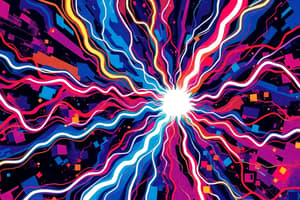Podcast
Questions and Answers
What do devices like motors, heaters, and light bulbs convert electrical energy into?
What do devices like motors, heaters, and light bulbs convert electrical energy into?
- Chemical energy
- Mechanical energy (correct)
- Sound energy
- Nuclear energy
Why is it essential to learn about safety when working with electricity?
Why is it essential to learn about safety when working with electricity?
- To increase energy consumption
- To make circuits more colorful
- To identify potential hazards and avoid accidents (correct)
- To make circuits louder
In simple circuits, what components can be added to examine their effects?
In simple circuits, what components can be added to examine their effects?
- Books, pens, papers
- Ovens, refrigerators, dryers
- Resistors, switches, bulbs (correct)
- Cameras, microphones, screens
By the end of the chapter on electricity and circuits, what will learners be able to recognize?
By the end of the chapter on electricity and circuits, what will learners be able to recognize?
What will learners be well-equipped to tackle after learning about electricity and circuits in Class 7?
What will learners be well-equipped to tackle after learning about electricity and circuits in Class 7?
What are the fundamental concepts covered in the chapter about electricity?
What are the fundamental concepts covered in the chapter about electricity?
How are components connected in a series circuit?
How are components connected in a series circuit?
Why is understanding the interaction between electricity and energy crucial in circuits?
Why is understanding the interaction between electricity and energy crucial in circuits?
What is the characteristic of parallel circuits?
What is the characteristic of parallel circuits?
In a series circuit, if one component fails, what happens to the others?
In a series circuit, if one component fails, what happens to the others?
Flashcards are hidden until you start studying
Study Notes
Exploring Electricity and Circuits in Class 7
In Class 7, you'll delve deeper into the fascinating world of electricity and circuits, where you'll learn how to understand and apply the fundamental concepts that power our everyday lives. Here's what you can expect to discover in this engaging chapter.
Electricity Basics
To begin our exploration, we'll cover the essentials of electricity. You'll learn about the movement of electric charges and the concepts of voltage, current, and resistance. Through hands-on experiments, you'll observe how these elements interact in circuits and the importance of each in determining the behavior of the system.
Electric Circuits
Circuits are networks of electrical components that allow current to flow and interact, creating electric devices. You'll examine the basic types of circuits and their components, such as:
- Series circuits: Here, components are connected end to end, with every part in the circuit receiving the same potential difference.
- Parallel circuits: In this arrangement, components are connected side by side, with each branch receiving the same current but different potential differences.
By understanding the behavior of these circuits, you'll be able to predict how altering components will influence the overall functioning of the circuit.
Electricity and Energy
Electricity and energy are closely linked, and understanding how the two interact is crucial in understanding circuits. You'll learn about the conversion of electrical energy into mechanical energy, heat, or light through devices like motors, heaters, and light bulbs.
Simple Circuits
With a solid grounding in the basics, you'll begin to explore simple circuits, examining the effects of adding components like resistors, switches, and bulbs to circuits. By experimenting with these components, you'll learn how to control current flow and create circuits with specific properties.
Safety and Electricity
It's essential to learn about safety when working with electricity. In Class 7, you'll cover the basic safety guidelines for working with electricity, including how to identify potential hazards and how to avoid them.
Electricity and Everyday Life
By the end of the chapter, you'll have a strong understanding of electricity and circuits and how they apply to everyday life. You'll be able to recognize the components of simple devices and how they work together, and you'll be well-equipped to tackle more complex topics in your future science studies.
Remember, this is just a taste of what you'll learn about electricity and circuits in Class 7. With curiosity and a willingness to explore, you'll be well on your way to becoming a confident and knowledgeable learner in this exciting field.
Studying That Suits You
Use AI to generate personalized quizzes and flashcards to suit your learning preferences.




